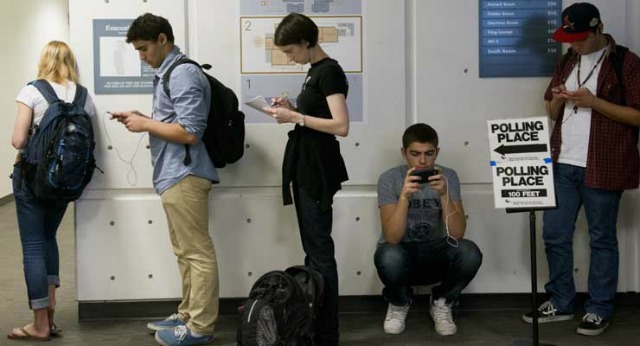
SHARE
READ & LEAVE A COMMENT

In 1990 the star-studded campaign “Rock the Vote” was developed with the goal of helping young people understand their political power and, ultimately, get them to the polls. Early in its history, this nonprofit partnered with MTV, Virgin Records and countless celebrity spokespeople to create a youth-centered platform for political education and ultimately political influence. Rock the Vote helped bring attention to many of the most impactful legislative initiatives of the 1990s, including LGBT rights, gun control and health care. Today, Rock the Vote continues with its original goal of ensuring that the youth in America understand their power when it comes to political influence.
The 2016 presidential election is one of the more followed by those of the Millennial generation than any other. Millennials are said to be the game changers of the 2016 election and will ultimately have one of the more dominant voices of this election season. 2016 will have the largest Millennial electorate of any political race and will be second only to the 2018 election season where all Millennials will be eligible to vote.
The Millennial generation has demonstrated its power over the political campaigns since the race to the next presidential election began in 2015. The biggest contributor to maintaining the political conversation among Millennials is social media. Those in D.C. have dubbed this presidential election the “social media election” because of the tremendous impact that online media has had on each candidate’s campaign. The twitter rants of Donald Trump and Jeb Bush, the online rallies of Bernie Sanders and Hillary Clinton, and the continuous twitter photo battles between all the candidates have shown up in the feeds of millions of social media Millennials.
In 2008, then-Senator Barack Obama was the first presidential candidate to use social media and digital marketing as a primary tool for reaching young voters. During that election he had the highest voter turnout for the 18- to 24-year-old demographic than any other candidate in history. Today President Obama’s social media presence is well known among the Millennial generation as he continues to stay active online.
Many political analysts believe that the 2016 election will be decided based on one candidate’s use of social media over another. What Donald Trump and Bernie Sanders do well is they always turn to social media for the last word. They ensure that every debate has a social media following, they use their online platforms to respond timely to any negative feedback, and they continue to develop their following online by demonstrating who they are as people on a daily basis.
Like the influence of Rock the Vote in the 1990s, social media has connected the newest youth voters by the constant stream of digital information targeting one area of the race or another. Even if the largest media outlets are unable to capture the attention of one single Millennial voter, social media has helped carry the conversations that will ultimately give each campaign its youth votes.
No matter what election or what candidate, the outcome can be won or lost in the hands of the youngest voting group. We will continue to see a rise in the impact of the political conversations in the hands of Millennials.
SHARE
READ & LEAVE A COMMENT